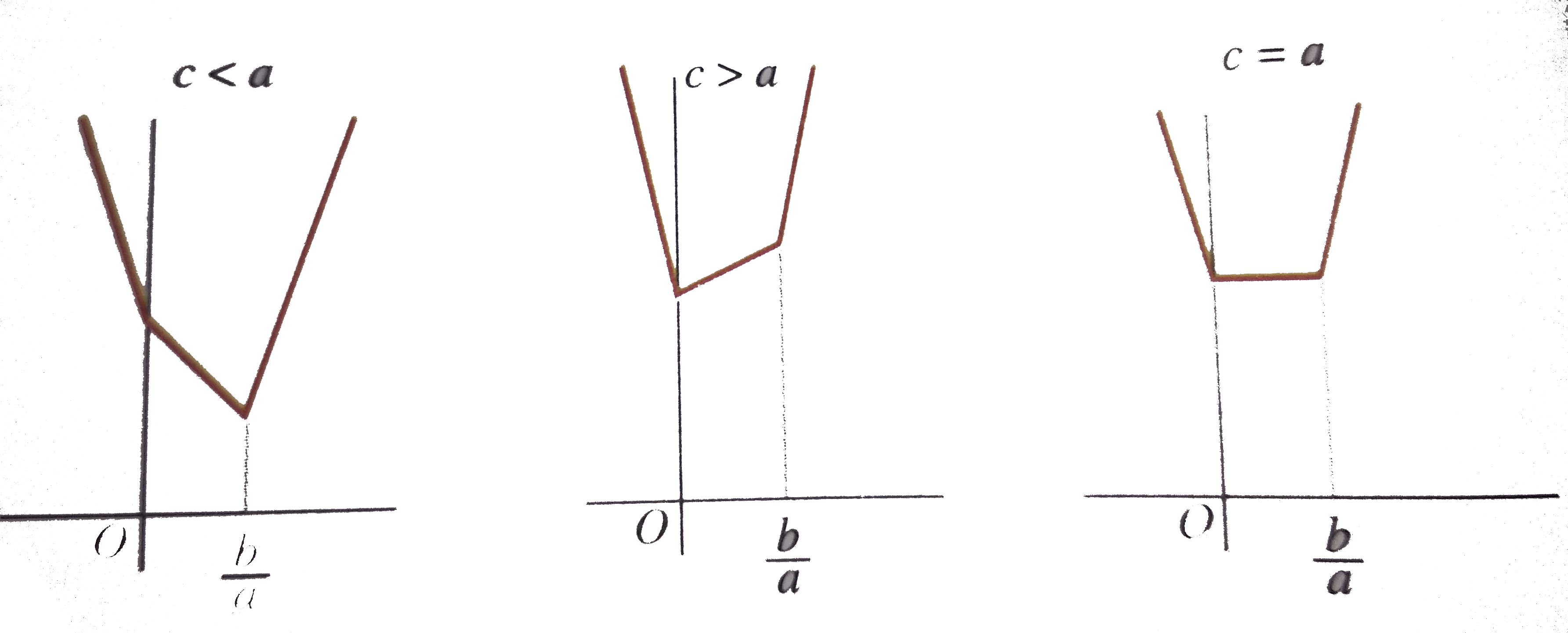f(x)=|ax−b|+c|x|∀x∈(−∞,∞), where a>0,b>0,c>0. Find the condition if f(x) attains the minimum value only at one point.
f(x)=⎧⎪
⎪⎨⎪
⎪⎩b−ax−cx,x<0b−ax+cx,0≤x<baax−b+cx,x≥ba
=⎧⎪
⎪⎨⎪
⎪⎩b−(a+c)x,x<0b+(c−a)x,0≤x<ba(a+c)x−b,x≥ba
The graphs of the function for different situations are as shown in the following figures.

From the figure, we can see that for c<aandc>a, there is only point of minima.
For c=a, there are infinite points of minima.
Thus, for exactly one point of minima, c≠a.
Topper's Solved these Questions
- BOOK - CENGAGECHAPTER - GRAPHS OF ELEMENTARY FUNCTIONS EXERCISE - Exercise34videos
GRAPHS OF ELEMENTARY FUNCTIONS
- BOOK - CENGAGECHAPTER - GRAPHS OF POLYNOMIAL AND RATIONAL FUNCTIONSEXERCISE - Exercise13videos
GRAPHS OF POLYNOMIAL AND RATIONAL FUNCTIONS
- BOOK - CENGAGECHAPTER - GRAPHS OF TRIGONOMETRIC FUNCTIONSEXERCISE - Exercise22videos
GRAPHS OF TRIGONOMETRIC FUNCTIONS
Similar Questions
Knowledge Check
- Question 1 - Select One
Let f(x)<0∀x∈(−∞,0)andf(x)>0∀x∈(0,∞) also f(0)=0, Again f'(x)<0∀x∈(−∞,−1)andf'(x)>∀x∈(−1,∞) also f'(−1)=0 given limx→∞f(x)=0andlimx→∞f(x)=∞ and function is twice differentiable.
The minimum number of points where f'(x) is zero is:A1B2C3D4 - Question 2 - Select One
The value of b for which the function f(x)=sin x-bx+c is decreasing in the interval (−∞,∞) is given by
Ab<1Bb≥1Cb>1Db≤1
Consider the function f:(−∞,∞)−−−−−→−∞,∞ defined by f(x)=x2+ax2+a,a>0, which of the following is not true? maximum value of f is not attained even though f is bounded. f(x) is increasing on (0,∞) and has minimum at ,=0 f(x) is decreasing on (−∞,0) and has minimum at x=0. f(x) is increasing on (−∞,∞) and has neither a local maximum nor a local minimum at x=0.
View SolutionLet f(x)=a+b|x|+c|x|4 , where a, b, and c are real constants. Then, f(x) is differentiable at x=0 , if a=0 (b) b=0 (c) c=0 (d) none of these
View SolutionIf the range of the function f(x)=3x2+bx+c is [0,∞) then value of b23c is
View SolutionIf f(x)=⎧⎨⎩limx→∞(6t+10t)1tx=0x2+4x+Cx=≠0 is a continuous function, then minimum value of f(x) is
View SolutionLet f(x)=a+b|x|+c|x|4 , where a,bandc are real constants. Then, f(x) is differentiable at x=0, if a=0 (b) b=0 (c) c=0 (d) none of these
View SolutionA function f(x) having the following properties,
(i) f(x) is continuous except at x=3
(ii) f(x) is differentiable except at x=-2 and x=3
(iii) f(0)=0limx→3f(x)→−∞limx→∞f(x)=3,limx→∞f(x)=0
(iv) f'(x)>0∀∈(−∞,−2)∪(3,∞) and f'(x)≤0∀x∈(−2,3)
(v) f''(x)>0∀x∈(−∞,−2)∪(−2,0) and f''(x)<0∀x∈(0,3)∪(3,∞)
Then answer the following questions
Find the Maximum possible number of solutions of f(x)=|x|View Solution

